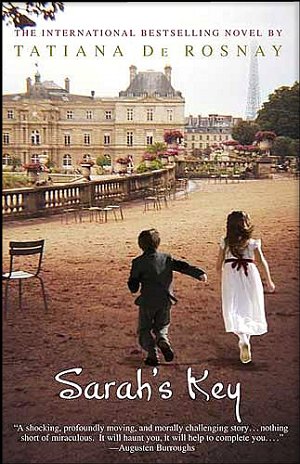
If you want to read a bestseller, just wait a few years after its hay day until it finds its way into Goodwills and used book stores. The book you are looking for is guaranteed to pop up, because it will be bought as gifts and recycled through office Christmas parties. If it’s sad? Even better, because people don’t tend to hang on to books that make them uncomfortable unless it also dramatically changed their world view. That’s why after I write this review, I’ll be doing the same and sending Tatiana de Rosney’s Sarah’s Key to its next life by donating.
I picked up Sarah’s Key at a fancy Goodwill that printed labels for each item. I was drawn to the story because it reminded me of the books I used to be obsessed with in middle school–the stories of Jewish young women trying desperately to escape the fate of the Nazis. From Lois Lowry’s Number the Stars to The Diary of Anne Frank, even not too long ago I had dove into Marcus Zusak’s The Book Thief–all of these works had been compelling for their glimpse into trauma and tragedy from the point of view of a child. With so much acclaim, Sarah’s Key seemed like the natural progression to reading more into the Holocaust genre of literature.
In One Sentence: A journalist must research the historic (and near undocumented) Vel’ d’Hiv Roundup, in which French police arrested thousands of Jews to send to concentration camps, and ends up connecting to the story of a young girl who tried to escape to save her family.
Favorite Line: “What was wrong with being a Jew? Why did some people hate Jews? Her father scratched his head, had looked down at her with a quizzical smile. He had said, hesitatingly, ‘Because they think we are different. So they are frightened of us.’ But what was different? thought the girl. What was so different?” – p. 88
Review: Sarah’s Key has two parallel story lines: young Sarah as she escapes a camp outside of Paris to reunite with her brother who she has locked in the closet and Julia, a married woman who in discovering the story of Sarah also deals with a crumbling marriage. It’s an interesting structure to play with how the past can change us in unexpected ways. I loved every passage dedicated to Sarah’s story, and while the moments it spilled into Julia’s worked well–I never quite felt as captured by Julia’s journey. By the second half of the novel, it’s really all about Julia. In a way, I understand why. In many ways, Julia directly connects with the reader as she learns of Sarah’s story at the same time and her response helps the reader reflect on their own. On the other hand, it’s also like having a built in commentator. Julia’s perspective shapes how we understand Sarah’s. I completely understand why this book has so much praise, but I wouldn’t recommend this book against others in the genre that made me feel more connected to the protagonists.
The Book Would Have Ended A Lot Sooner If: either Julia had taken another assignment or Sarah let her brother be captured.
More on the Vel’ d’Hiv Roundup:

Entrance to the Vel’ d’Hiv (The Winter Stadium) where Jews were detained en mass before being deported
NY Times: France Reflects on Its Role in Wartime Fate of Jews (2012)
